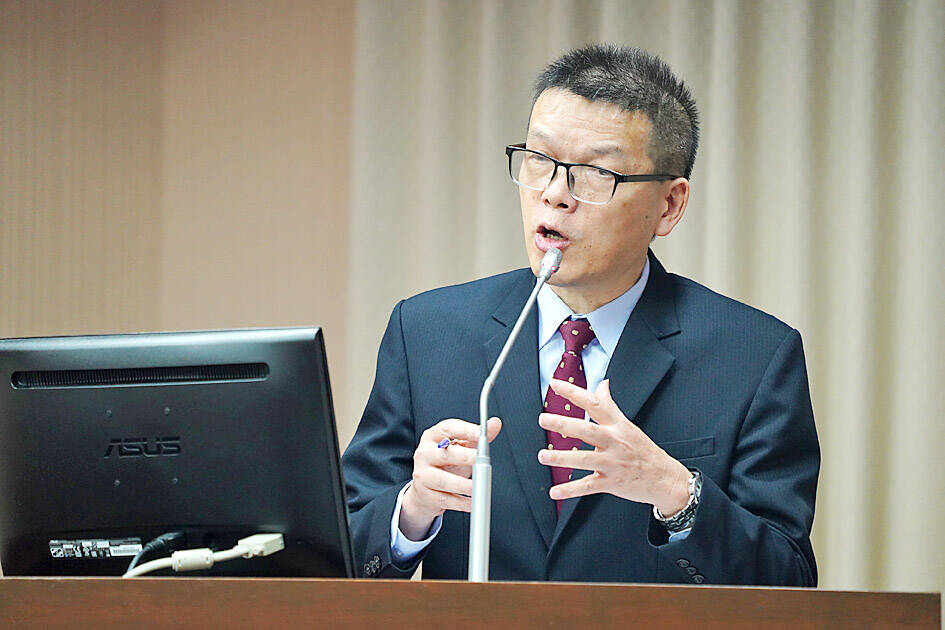Users of iPhones are to stop receiving text messages transmitted through 2G base stations by the end of this year as part of government efforts to deter fraud, the National Communications Commission (NCC) said yesterday.
The issue came under scrutiny at a meeting of the legislature’s Transportation Committee, which was to release frozen funding for the telecommunications authority.
Democratic Progressive Party (DPP) Legislator Tsai Chi-chang (蔡其昌) said that police cracked down on a fraud ring in southern Taiwan that used fake 2G base stations to distribute “111” messages, he said.

Photo: CNA
The number is used for text messages sent from government agencies.
That meant that scammers could pose as government agencies and send seemingly legitimate messages, Tsai said, adding that the commission needs to work with the Ministry of Digital Affair to step up awareness campaigns for that type of fraud.
NCC Acting Chairman Chen Chung-shu (陳崇樹) said that mobile phones that were certified before September 2023 would still receive text messages from 2G base stations.
Since September 2023, mobile phone manufacturers have been specifically required to preset their products to not receive 2G messages for users in Taiwan. However, fraud rings have found ways to send fake text messages.
“New mobile phones with Android operating systems that were type-approved from May 1 would be preset to stop receiving 2G messages. iPhones, which use the iOS system, would receive 2G messages until system updates are complete by the end of this year,” Chen said.
While old mobile phones can conduct over-the-air software updates, some outdated phone models might not support any system update and could still receive 2G messages, he said.
Tsai and Chinese Nationalist Party Legislator Gary Huang (黃建豪) also asked the commission how it prevents prepaid cards from being used to commit fraud.
There were about 2.3 million prepaid card users as of October last year, of which 1.3 million had been verified by April, Chen said.
“Prepaid services would be suspended if users have left the country or overstayed their visas,” he said, referring to migrant workers who often use prepaid cards.
Chunghwa Telecom is scheduled to finish verifying prepaid card accounts next month, while Taiwan Mobile and Far Eastone Telecommunications are to complete account verifications in August, he said.

The manufacture of the remaining 28 M1A2T Abrams tanks Taiwan purchased from the US has recently been completed, and they are expected to be delivered within the next one to two months, a source said yesterday. The Ministry of National Defense is arranging cargo ships to transport the tanks to Taiwan as soon as possible, said the source, who is familiar with the matter. The estimated arrival time ranges from late this month to early next month, the source said. The 28 Abrams tanks make up the third and final batch of a total of 108 tanks, valued at about NT$40.5 billion

Two Taiwanese prosecutors were questioned by Chinese security personnel at their hotel during a trip to China’s Henan Province this month, the Mainland Affairs Council (MAC) said yesterday. The officers had personal information on the prosecutors, including “when they were assigned to their posts, their work locations and job titles,” MAC Deputy Minister and spokesman Liang Wen-chieh (梁文傑) said. On top of asking about their agencies and positions, the officers also questioned the prosecutors about the Cross-Strait Joint Crime-Fighting and Judicial Mutual Assistance Agreement, a pact that serves as the framework for Taiwan-China cooperation on combating crime and providing judicial assistance, Liang

A group from the Taiwanese Designers in Australia association yesterday represented Taiwan at the Midsumma Pride March in Melbourne. The march, held in the St. Kilda suburb, is the city’s largest LGBTQIA+ parade and the flagship event of the annual Midsumma Festival. It attracted more than 45,000 spectators who supported the 400 groups and 10,000 marchers that participated this year, the association said. Taiwanese Designers said they organized a team to march for Taiwan this year, joining politicians, government agencies, professionals and community organizations in showing support for LGBTQIA+ people and diverse communities. As the first country in Asia to legalize same-sex

MOTIVES QUESTIONED The PLA considers Xi’s policies toward Taiwan to be driven by personal considerations rather than military assessment, the Epoch Times reports Chinese President Xi Jinping’s (習近平) latest purge of the Chinese People’s Liberation Army (PLA) leadership might have been prompted by the military’s opposition to plans of invading Taiwan, the Epoch Times said. The Chinese military opposes waging war against Taiwan by a large consensus, putting it at odds with Xi’s vision, the Falun Gong-affiliated daily said in a report on Thursday, citing anonymous sources with insight into the PLA’s inner workings. The opposition is not the opinion of a few generals, but a widely shared view among the PLA cadre, the Epoch Times cited them as saying. “Chinese forces know full well that